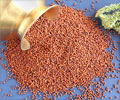
‘New 2020-2025 dietary guidelines are the first to offer guidance for healthy dietary patterns by what the departments call "life stages," since people at various ages should be consuming different diets. The guidelines emphasize eating nutrient-rich foods and "making every bite count."
’
Tweet it Now
Of importance, the DGAs maintained the existing recommendation for the average healthy American adult to consume six one-ounce servings of grain foods daily, with half of those servings coming from whole grains.For the first time, the DGAs included recommendations for birth to two years. The Grain Chain applauds the recognition of grains as one of the traditional, nutritious first foods for infants. Numerous research studies have demonstrated significant, positive effects of nutrient absorption, improved nutrition quality, and overall wellness from enriched grains at various life stages.
The key takeaways from the 2020-2025 Dietary Guidelines for Americans for the grains-based foods industry:
- Grains, both enriched and whole, play a key role in healthy dietary patterns and diet quality
- Grains are a significant contributor of dietary fiber, a generally under-consumed nutrient for Americans
- Grains contribute to overall diet quality through key essential nutrients
- Grains are a delicious, versatile, affordable, and sustainable plant-based food
- Enrichment and fortification of grains are key contributors to positive public health impacts
- Since folic acid fortification of enriched grain foods became required in 1998, the prevalence of babies born with neural tube defects (NTDs) has decreased by 35% in the U.S., leading the Centers for Disease Control & Prevention (CDC) to name folic acid fortification of enriched grains one of the top 10 public health achievements of the first decade of the 21st century
The DGAs included guidance on enriched grains, maintaining the existing recommendation of three one-ounce servings of enriched grains daily. While the guidelines cite science-backed evidence of positive health outcomes from the inclusion of enriched grains, the Grain Chain is extremely concerned to see the DGAs include contradictory language linking "refined grains" with poor dietary patterns and health outcomes.
Published scientific research clearly and unequivocally illustrates the key roles of grains - both enriched and whole - in healthy dietary patterns and their significant contributions to diet quality. To clarify and correct potential consumer confusion resulting from this contradictory language, the members of the Grain Chain look forward to partnering with the USDA and HHS to help educate the public on the value of both enriched and whole grains.
Advertisement
Others in the Grain Chain weighed in on the recommendations published in the 2020-2025 Dietary Guidelines:
Advertisement
"The Guidelines are an essential map for consumers, policy-makers, and feeding program implementers to use as they feed themselves, their families, and the most vulnerable in our country," said Christine Cochran, Executive Director, Grain Foods Foundation. "The unity of the Grain Chain's message and the importance of its being heard have been affirmed in this DGA cycle today: the nutritional contribution of grains is essential in the diet at all stages of life."
As a member of the Grain Chain coalition, the USA Rice Federation supports and appreciates the ongoing efforts to provide input and guidance on the development of the 2020-2025 Dietary Guidelines for Americans. "Research has repeatedly demonstrated the benefits of enriched and whole-grain consumption and its correlation to a healthy eating pattern," said USA Rice President & CEO Betsy Ward. "USA Rice stands with its Grain Chain partners in support of the comments submitted and the overall recommendation that the nutritional benefit of grain consumption is vital at all stages of life."
"Enriched and whole wheat and grain-based foods provide important nutritional benefits, are affordable and foundational foods in many cultures. Regular consumption of wheat and other grains delivers key nutrients including B vitamins, folate, iron, and fiber," said Tim O'Connor, President of the Wheat Foods Council.
NAMA President Jane DeMarchi stated, "We are delighted that the nutritional value of both wholes and enriched grains in the diet, which is supported by vast scientific research, is acknowledged by the updated Dietary Guidelines. Grain foods are staples that create the foundation for a healthy and balanced diet. They are affordable, versatile, convenient, and easy to store. The significance of these qualities cannot be overstated in normal times, much less during a global pandemic where families are stressed, and food dollars are stretched."
Pasta is an essential staple on the American table and plays an important role in supporting healthy dietary patterns, especially in the Mediterranean Diet, which has been shown to have a number of positive benefits," said Delia Murphy, Executive Director of the National Pasta Association. "Through our participation in the Grain Chain, NPA is proud to reinforce and acknowledge the importance of both enriched and whole grains in the Dietary Guidelines and their contribution to diet quality and key positive nutrients."
Source-Eurekalert













